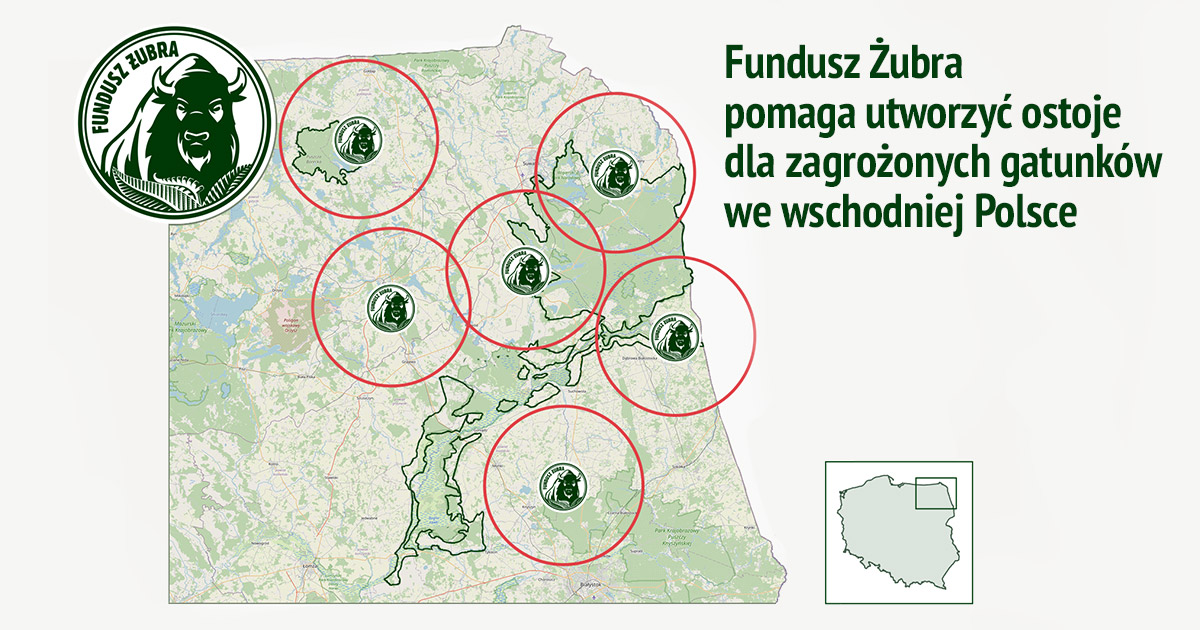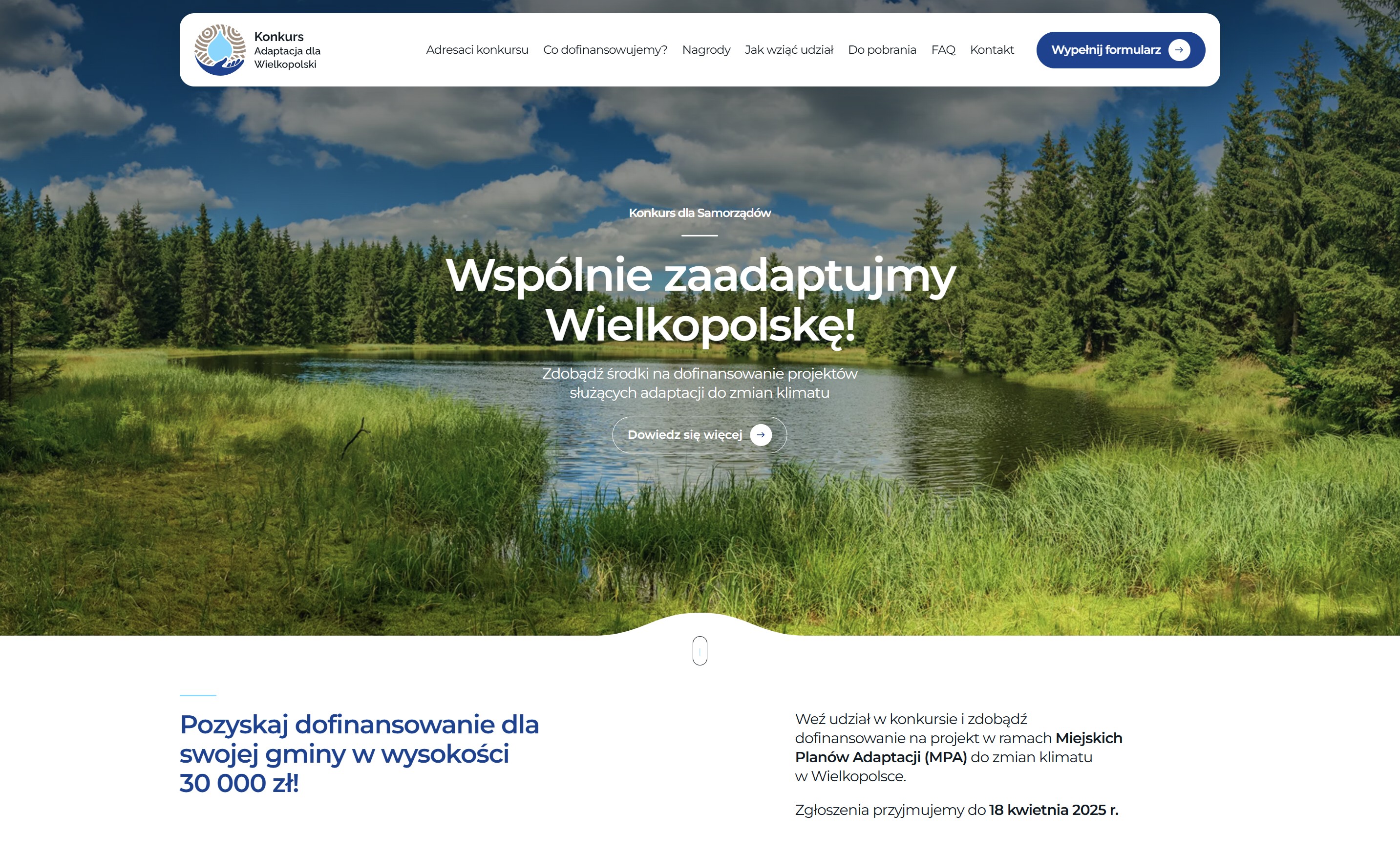The Żubr Fund helps to open sanctuaries for endangered species in eastern Poland
The Żubr Fund joins forces with the Nature Heritage Foundation to launch two innovative campaigns aimed at supporting nature by creating micro-reserves and eternal forests. That way, it once again contributes to creating wildlife sanctuaries, protecting biodiversity and slowing down climate change.
Creating 50 conservation zones in the form of micro-reserves that will allow to shelter endangered bird species, including the golden eagle or black stork, and lichen species, as well as sponsoring 15 hectares of eternal forests created exclusively by nature and protected against extinction. These are the two new ecological priorities of the Żubr Fund, which was established to protect wildlife in Poland in a comprehensive and sustainable way. Setting up nature sanctuaries along with giving up active protective measures is in line with the modern approach to ecology, the assumption of which is to also minimize the carbon footprint.
– Let’s not forget that nature has been functioning without any help from humans for millions of years, a the solar-powered biosphere maintained dynamic balance, creating incredible biological abundance – says Professor Bogdan Chojnicki from the University of Life Sciences in Poznań. – Only after homo sapiens and the industrial era emerged, plant and animals started disappearing as a result of missing their living space. Therefore, creating places where nature can regenerate, free from any human impact, is key to maintain biodiversity and climate balance.
Micro-reserves are very successful in protecting endangered species, especially during the key time of their existence: the breeding season. As part of its activity, the Nature Heritage Foundation submits old trees for zonal protection, which serve as nesting spots for the very few golden eagles left (only 25-30 couples), protected lesser spotted eagles, black storks and pygmy owls, and host endangered lichen species. It will help create a 50-200m radius space free from clearance and logging.
The micro-reserves under the patronage of the Żubr Fund will be created within the borders of two massive ecosystems: the Carpathian Forest and Puszcza Borecka in the Warmian-Masurian Voivodeship. Thanks to them the following species will be protected: lesser spotted eagle, pygmy owl, golden eagle, black stork, as well as old trees and rare lichen species.
The eternal forests project aims to purchase parcels often considered wasteland and – literally – leave them be. Free from human impact, these areas facilitate natural selection and creating a self-sufficient nature sanctuary, serving as a climate regulator. Since there are no environmental protection activities executed there, no carbon footprint is generated. Eternal forests will grow in the vicinity of conservation areas, such as wetlands, mountains, river valleys and important wildlife corridors. Around the Biebrza river, they will protect the habitats of various species, including the horned owl, crane and greater spotted eagle, as well as many other species looking for food along wetlands, where they find refuge during heatwaves, such as the moose. In the Carpathians, eternal forests will serve as sanctuary for the lynx, black stork, brown bear, Ural owl and lesser spotted eagle.
Biodiversity, which is the legacy of millions of years of biological processes taking place on our planet, is now in our hands. Our decisions will determine the state in which we hand it over for the next generations, and eternal forests and micro-reserves can help improve its condition.
– Every eternal forest accumulates carbon, and at the same time efficient stabilises micro-climate conditions – explains Professor Chojnicki. – In other words, it is a potentially massive container for CO₂ absorbed from the atmosphere and simultaneously an effective tool to protect nature against climate change.
The Nature Heritage Foundation is an expert organization associating naturalists and foresters aiming to protect the natural heritage of our country as well as the areas shared by Poland, Ukraine and Slovakia. The list of the Foundation’s ecological achievements includes identification of thousands of endangered and indicative species for primary forests and several dozen new species or species considered extinct in our country.
– In view of the climate crisis and species extinction problem we must act now – emphasizes Radosław Michalski, President of the Nature Heritage Foundation. – It is important not only to provide zonal protection but also to give land back to nature. The latter we can ensure by buying land, which we then return to nature. Instead of planting trees we allow the natural processes to arrange the forest. In the times of global warming, we must do all possible to minimise the negative results of climate change.
The activity of the Nature Heritage Foundation can be supported with donations at https://www.przyrodnicze.org. Every donated sum will contribute to the protection of invaluable Polish wildlife. Creating sanctuaries on a micro and macro scale constitutes a continuation of the eco initiatives of the Żubr brand owned by Kompania Piwowarska and the Żubr Fund, the goal of which is to educate the society and save and protect nature in the most environmentally valuable regions of Poland.
– We are happy to partner up with the Nature Heritage Foundation, which has extensive experience and knowledge in the field of environmental protection – says Urszula Czerniawska-Kapeluch, Żubr Senior Brand Manager. – Protecting existing habitats of endangered animal species and creating new wildlife sanctuaries for the Polish nature are in our opinion some of the best ways to get the brand engaged in activities aimed at the improvement of conditions for wild animals in Poland – she adds.
The Żubr Fund supports various pro-environmental initiatives: long-term, as the cooperation with the Białowieża National Park, and those that require immediate action, like providing help when the Biebrza valley was on fire. In 2019, the Żubr brand donated one million zloty to protect endangered species, in 2020 it financed specialist equipment for the Białowieża National Park worth one million zloty and this year another million will be allocated to protect wild nature in its original shape.
The Żubr Fund’s last year’s campaign aimed at helping purchase lands within the Biebrza National Park, was widely recognised in the Polish and international media and contributed to increasing the protected area of the Park by 250,000 m².
When executing pro-environmental initiatives, the Żubr Fund always relies on the knowledge of scientists and ecologists, who are considered experts on a particular subject. It also support the engagement of local communities, as only joint efforts can bring lasting results.
It is the fourth edition of the “Żubr Protects Endangered Animal Species” campaign and the Żubr Fund’s activity. By the end of the year, three more campaigns will have been launched in cooperation with various eco-friendly organizations. More information about the Fund can be found here: https://funduszzubra.pl/
Would you like to contact our Press Office?
Borys Gryniewicz
Communications Manager
If you want to file a complaint or provide your opinion on our beers, use the contact details available in the ‘contact us’ tab.





